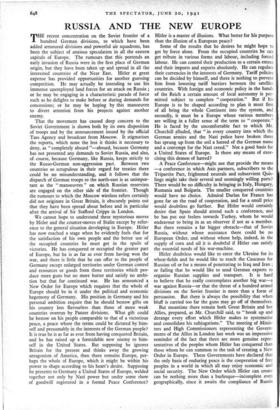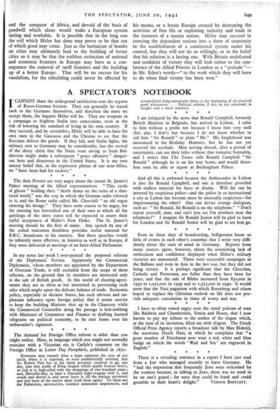RUSSIA AND THE NEW EUROPE
THE recent concentration on the Soviet frontier of a hundred German divisions, to which have been added armoured divisions and powerful air squadrons, has been the subject of anxious speculation in all the eastern capitals of Europe. The rumours that this portends an early invasion of Russia were in the first place of German origin, but they have been taken up and spread in all the interested countries of the Near East. Hitler at great expense has provided opportunities for another guessing competition. He may actually be intending to use his immense unemployed land forces for an attack on Russia ; or he may be engaging in a characteristic parade of force such as he delights to make before or during demands for concessions; or he may be hoping by this manoeuvre to divert attention from his projects against another enemy.
That the movement has caused deep concern to the Soviet Government is shown both by its own disposition of troops and by the announcement issued by the official Tass Agency and broadcast from Moscow. It stigmatises the reports, which none the less it thinks it necessary to deny, as " completely absurd "—absurd, because Germany has not presented any demands to Soviet Russia, and also, of course, because Germany, like Russia, keeps strictly to the Russo-German non-aggression pact. Between two countries so scrupulous in their regard for treaties there could be no misunderstanding, and it follows that the dispatch of German troops to the north-east is as unimpor- tant as the " manoeuvres " on which Russian reservists are engaged on the other side of the frontier. Though the rumours to which the Moscow wireless refers certainly did not originate in Great Britain, it obscurely points out that they have been spread about before and in particular after the arrival of Sir Stafford Cripps in London.
We cannot hope to understand these mysterious moves by Hitler and the counter-moves of Stalin except by refer- ence to the general situation developing in Europe. Hitler has now reached a stage when he evidently feels that for the satisfaction of his own people and the better use of the occupied countries he must get in the spoils of victories. He has conquered or occupied the greater part of Europe, but he is as far as ever from having won the war, and there is little that he can offer to the people of Germany except enlarged territories under German control and resources or goods from those territories which pro- duce more guns but no more butter and satisfy no ambi- tion but that for continued war. He has announced -a New Order for Europe which requires that the whole of Europe should be in it under the political and economic hegemony of Germany. His position in Germany and his personal ambition require that he should bestow gifts on his country less flavourless than those of more weak countries overrun by Panzer divisions. What gift could he bestow on his people comparable to that of a victorious peace, a peace where the terms could be dictated by him- self and presumably in the interests of the German people? It is true he is as far as ever from having conquered Britain, and he has raised up a formidable new enemy to him- self in the United States. But supposing he ignores Britain for the present and thinks away the growing antagonism of America, then there remains Europe, per- haps the whole of Europe, which it might be within his power to shape according to his heart's desire. Supposing he presents to Germany a United States of Europe, welded together not only by Nazi power but under some show of goodwill registered in a formal Peace Conference? Hitler is a master of illusions. What better for his purpose than the illusion of a European peace?
Some of the results that he desires he might hope to get by force alone. From the occupied countries he can get tribute in various forms and labour, including forced labour. He can control their production to a certain extent and their imports and exports absolutely. He can regulate their currencies in the interests of Germany. Tariff policies can be decided by himself, and there is nothing to prevent him from lowering tariff barriers between the satellite countries. With foreign and economic policy in the hands of the Reich a certain amount of local autonomy is per- mitted subject to complete " cooperation." But if his Europe is to be shaped according to plan it must first of all bring the whole Continent into the system, and secondly, it must be a Europe whose various members are willing in a fuller sense of the term to " cooperate."
He is faced by the uncomfortable fact to which Mr.
Churchill alluded, that " in every country into which the German armies and the Nazi police have broken there has sprung up from the soil a hatred of the German name and a contempt for the Nazi creed." Not a good basis for a United States of Europe. Is there any means of exor- cising this demon of hatred?
A Peace Conference—might not that provide the means —a conference in which Axis partners, subscribers to the Tripartite Pact, frightened neutrals and subservient Quis- lings might take their several and seemingly willing parts? There would be no difficulty in bringing in Italy, Hungary, Rumania and Bulgaria. The smaller conquered countries would have no choice. Admiral Darlan for France has gone far on the road of cooperation, and for a small price would doubtless go further. But Hitler would certainly desire that Spain should attend such a conference, and he has put out feelers towards Turkey, whom he would endeavour to bring in as an observer if not as a member.
But there remains a far bigger obstacle—that of Soviet Russia, without whose assistance there could be no European Order, and without whose help, indeed, in the supply of corn and oil it is doubtful if Hitler can satisfy the essential needs of his war-machine.
Hitler doubtless would like to enter the Ukraine for its wheat-fields and he would like to reach the Caucasus for Russian oil or for a means of penetrating to Iraq and Iran ; or failing that he would like to send German experts to organise Russian supplies and transport. It is hard to believe that he really contemplates another big war—a war against Russia—or that the threat of a hundred armed divisions on the Soviet frontier is more than a form of persuasion. But there is always the possibility that when bluff is carried too far the guns may go off of themselves.
But meantime there remain both Great Britain and her Allies, prepared, as Mr. Churchill said, to " break up and derange every effort which Hitler makes to systematise and consolidate his subjugations." The meeting of Minis- ters and High Commissioners representing the Govern- ments of the Allies in London last week was an impressive reminder of the fact that there are more genuine repre- sentatives of the peoples whom Hitler has conquered than those whom he can summon to the task of creating a New Order in Europe. These Governments have declared that the only basis of enduring peace is the cooperation of free peoples in a world in which all may enjoy economic and social security. The New Order which Hitler can create can be nothing more than a burlesque—incomplete even geographically, since it awaits the compliance of Russia and the conquest of Africa, and devoid of the basis of goodwill which alone would make a European system lasting and workable. It is possible that in the long run the evil which Hitler has done may prove to be that out of which good may come. Just as the barbarism of bombs on cities may ultimately lead to the building of better cities so it may be that the ruthless extinction of national and economic frontiers in Europe may have as a con- sequence the removal of tariff frontiers and the building up of a better Europe. That will be no excuse for his vandalism, for the rebuilding could never be effected by his means, or a better Europe created by destroying the activities of free life or exploiting industry and trade in the interests of a master nation. Hitler may succeed in coercing the dependent nations into a show of unanimity in the establishment of a continental system under his control, but they will not do so willingly, or in the belief that his solution is a lasting one. With Britain undefeated and confident of victory they will look rather to the con- ference of the Allied Powers in London as a " prelude "- in Mr. Eden's words—" to the work which they will have to do when final victory has been won."



























 Previous page
Previous page